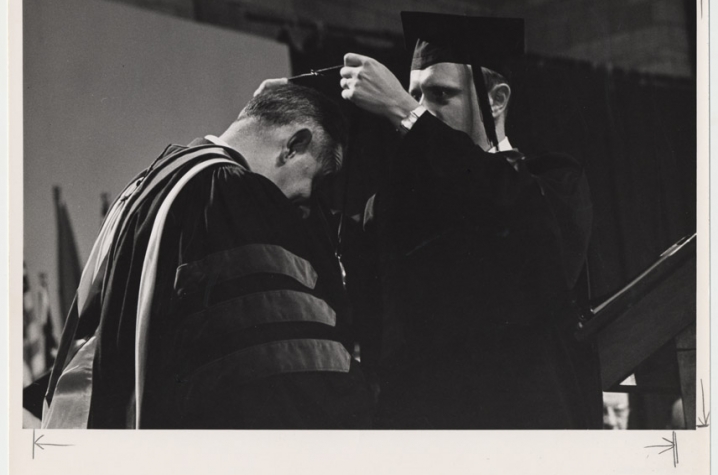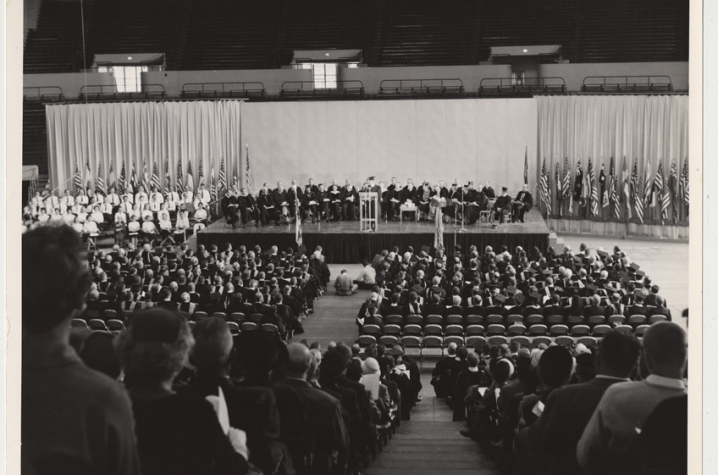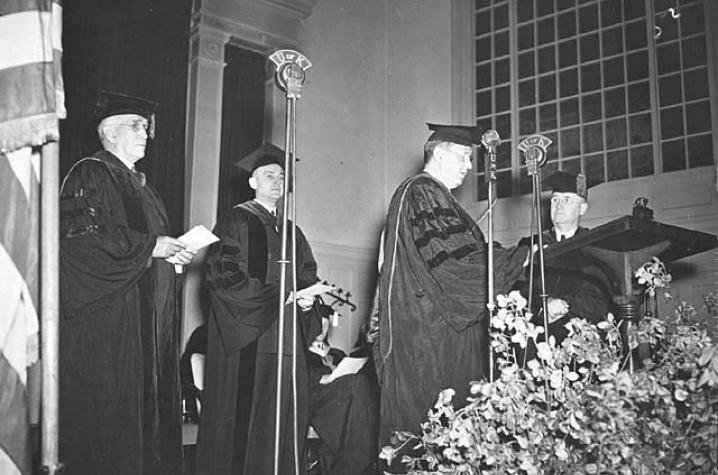Investiture: A Time of Change
LEXINGTON, Ky. (Sept. 30, 2011) − As Dr. Eli I. Capilouto's investiture ceremony approaches on Oct. 18, one thing is certain, he will share with the university community his vision for the future of the University of Kentucky.
Through the years, presidential investiture and inauguration ceremonies have marked the changing of the guard in UK's highest seat of the administration. In addition, the ceremony has been a time for the university's new president to share his view on the role the university will play in society. While the ceremonies may stick to the traditions of years past with all its regalia, UK's presidents have often taken this time to impart a message of change.
For a transcript of the video above, click here.
"What comes through in anything you read about all the presidents, is from day one it’s a challenge," says Terry Birdwhistell, dean of UK Libraries, who served the university first as an oral historian and an archivist. "Anyone who wants to be a leader in higher education must understand from the very beginning that it's a challenge, and their goal is to leave the place better than they found it. And that's not an easy task sometimes."
From its humble beginnings, UK was changing on a daily basis and James K. Patterson was there to witness it firsthand. The university's future president came to Lexington to serve as principal at Transylvania Academy in 1861. He was still at the institution when Transylvania College, Kentucky University (KU) and the newly state-chartered Agricultural and Mechanical (A&M) College of Kentucky merged in 1865. In this enlarged "Kentucky University," Patterson took an appointment as professor of Latin and civil history.
For a transcript of the video above, click here.
In 1869, Patterson would rise to the position of presiding officer of the university's A&M College. With the university embroiled in denominational and theological bickering and weakened by financial hardship, the state legislature formally separated the A&M College from KU in 1878. At that time, Patterson assumed the position of president of the independent school that would later become the University of Kentucky.
In an attempt to repair the fiscal damage incurred by the school during its 13 years linked to Kentucky University, Patterson fought to establish a one-half-cent state property tax to raise funds to support the struggling college. After an impassioned speech on the floor of the Kentucky Senate, the measure was approved in 1882. However, the revenue from the tax didn't meet the university's needs and Patterson took out a personal loan to make ends meet. Curricular diversification would allow A&M to upgrade its official academic classification and in 1908 Patterson and the Board of Trustees would successfully lobby the state's General Assembly to be named "State University, Lexington, Kentucky." He continued as president for two more years, assisting in the transition of the institution to university status before retiring in 1910.
Seven years later when Frank L. McVey was selected UK's third president after a national search, the nation was in the thick of World War I. McVey recognized the monumental challenges facing the country and took the opportunity of his investiture to share his vision for how UK would help serve the nation, as well as its student body, noting that in fact the university itself was in the war.
For a transcript of the video above, click here.
"The great war has placed new responsibilities upon all mankind; everywhere calls to service previously unknown are made with emphasis upon leadership, causing those in authority to turn to education and educational processes to the meet the situation," said McVey, at his installation address held June 4, 1918.
McVey's speech put an emphasis on teaching leadership skills and helping create graduates with a "trained intelligence" that could meet the country's demands at this dire time. During his tenure, there was an emphasis on the work of a Reserve Officers' Training Corps (ROTC) and in developing courses in domestic science and nursing to train the women working on the homefront.
Developments focused on the war effort were only the beginning of the changes McVey would bring to campus. As president of UK, McVey was credited with creating an intellectual atmosphere that focused on attracting better faculty, expanding its service to the Commonwealth and building a better campus. McVey retired in 1940.
Like McVey before him, President Herman L. Donovan would have to charter a new course for the university as the nation became engaged in war again. Donovan, who took the helm in 1941, would lead UK through World War II and its aftermath. The challenges ahead weighed heavily on the new president.
For a transcript of the video above, click here.
"This is a difficult time to come to the presidency of a university," Donovan said. "It is not the time I would have chosen."
In response to the loss of male students to the military, the university made available early graduate programs to ROTC enlistees and to students drafted into the armed forces. Donovan even made UK facilities available to the Army Specialized Training Program, which trained officers serving in the Army Corps of Engineers.
While cognizant of the war, Donovan felt change was inevitable and took time in his inauguration address to emphasize that education alone was the core mission of UK and that the institution must proceed with its mission.
"We at the University have mapped out a program for serving the nation in this hour of peril. It is a program of action, positive, dynamic and militant in character," said Donovan. "But the University is essentially an educational institution. It must maintain its integrity as a center of culture, or it will perish. Our first business is to pursue the University's major mission, that of teaching and learning. We dare not permit the whirlwind that shakes the earth to blow out the lamp of learning, to extinguish the candle of culture. Education like life must go on, otherwise chaos and the long night."
Donovan would go on to share his social vision for UK and the need for universities to produce more social engineers in addition to men of science whose inventions could be used for evil as well as good. These social engineers would have knowledge of anthropology, social psychology, history, political science, geography, economics and sociology.
"It is his business to take the machines and gadgets the scientists have made and to discover how we can use them to our advantage; to make these instruments a blessing to mankind and not a curse," said President Donovan, who stepped down in 1956.
When Frank G. Dickey took the helm in 1957, the new president took his inauguration as an opportunity to call on the citizens of Kentucky to help UK grow to meet future needs. He warned of the "crisis" facing America's college and universities as studies showed that the numbers of men and women enrolled in higher education would double from 3 million to 6 million by 1970. Dickey also acknowledged that UK, like many institutions, was "in no shape to cope with such a vast multiplication of students." Feeling the strain of the challenge, the president called on the community to help him help the university meet these needs and promised its successes would benefit all.
For a transcript of the video above, click here.
"The University of Kentucky in these days ahead will not be an inexpensive operation, but relatively speaking, it will cost little compared to the dividends which will accrue to the people of our state, our region and our nation as a result of the education of the youth for these tasks ahead," said Dickey.
Dickey shared how important that UK continue to build a "community of learning" that is home to faculty members who are devoted to great teaching and that attracts a better, higher-achieving student.
"No university can be much better than the preparation and the ambition of the student who it enrolls," said Dickey. "Therefore, we are interested in having the best possible students and then in creating an atmosphere in which they can work most effectively."
President Dickey also unveiled his ideas for expansion of the campus to serve the 12,000 to 15,000 projected students UK expected enrolled by 1965. He resigned in 1963 to take the job of director of the Southern Association of Colleges and Schools.
John W. Oswald, who became president of UK in 1964, used his inauguration address to lay out a plan for how the university would bridge the gap between its first and second centuries. As part of his speech, he outlined five imperatives of his proposed academic blueprint for UK, which focused on faculty, enrollment, curricula, students and additional roles of the university.
For a transcript of the video above, click here.
"The responsibility is that we, participating in this period of transition, make sure that the foundations for a strong University laid during its first century will be adequately built upon and added to in its second, so that an even stronger University develops," said Oswald.
Oswald believed the quality of the university depended upon the quality of the faculty. His first imperative focused on providing the best possible conditions and environment in order to compete with other universities in attracting the best faculty. Like Dickey before him, Oswald recognized the need to continue preparing the university for the growing numbers of students that would enroll in the next 10 years at the institution.
President Oswald also used his address to call for the examination of the university's curriculum and pushed the university community to be ready to make whatever changes deemed necessary to meet the needs of the time.
"In many university curricula here and elsewhere, it is my opinion that undergraduates are being overtrained and undereducated," said Oswald. "In short, we have an obligation to provide a strong liberal base for all students so that they will be able to make knowledgeable decisions not only in their professions but as parents, as citizens, and as individuals. If our examination calls for minor curricular change, this must be accomplished; likewise, if it points to a major revision in the structure of the University, we must not shirk this duty."
Oswald's fourth imperative called on the university to accept additional roles and become more active as a research center to help meet the needs in professionally trained careers. He took time in his address to recognize the university's first class of graduating medical doctors and its agricultural program, which was working to meet the needs of feeding a larger population on less and less acreage.
President Oswald ended his speech calling on the university to view the student as a "partner in the process of learning and research" who should help shape the educational experience.
"Increasingly the student must be brought into the core of the University--into discussions involving its future mission and in the ways this mission should be accomplished," said Oswald, who valued his informal talks with the students and was confident they understood the importance of the educational structure.
Oswald went on to say the students "represent a great reservoir of thought and energy that will be sorely needed as we enter our second century." Oswald, UK's sixth president, resigned the presidency in 1968. He would go on to serve as president of Pennsylvania State University from 1970 to 1983 before retiring.
Most recently, President Lee T. Todd Jr. first shared his dreams for UK's future at his inauguration address in 2001 where he challenged the university community to dream bigger dreams and work together to make them a reality. As part of his speech, Todd took on the challenge of Governor Patton and Kentucky's legislature to become a Top 20 public research university by 2020 and he praised the work already being done at UK through the "Bucks for Brains" initiative.
"We must have another round of 'Bucks for Brains' for the good of this university and for the good of the citizens of Kentucky," said Todd. "Then we must dream big dreams and continue to drive this university forward."
Todd stressed the need for the university to expand its research enterprise bringing in more research funding across the board and asked researchers to also consider how their research could better serve the state's needs directly.
"I believe that in our charge to serve the Commonwealth we must conduct research that 'hits the ground in Kentucky,' that changes the lives of Kentuckians; we must have a mission with a higher purpose," said Todd.
Furthermore, Todd called on the university community to target several specific problems plaguing the state. Researchers were asked to help address such "uglies" as lung cancer, diabetes, obesity, illiteracy and a bad economy. The outreach and research being done could then be applied to similar issues across the U.S. and around the world.
For a transcript of the video above, click here.
"I want our best minds working on our toughest problems," said Todd. "Kentucky should be a laboratory for our best researchers."
To help advance these dreams for the institution, he asked the university to do more.
"As we strive to meet our goals in this University, we must be determined to submit more proposals, write more articles, attract better students, hire and retain top faculty, operate more efficiently, and teach with higher quality," said Todd.
In addition to advancing the state and faculty, Todd wanted to also improve student life and championed a more diverse campus. The 11th president worked to grow the number of scholarships and fellowships available, add more student-centered experiences, and improve the classroom environment. Todd established bodies focused on diversity and women's issues on campus. A successful businessman, as well as an educator, Todd also asked the university community to think more entrepreneurially to help advance the institution.
"We must find additional revenue sources," said Todd. "We cannot wait every two years to see what happens in Frankfort to decide what we can do. We need new programs, partnerships, and betters use of intellectual property to generate not just royalties but jobs and companies in our community. In order to have a bigger vision, we must seek alternative sources of support."
When the university comes together at the Singletary Center for the Arts on Oct. 18, UK will hear President Eli Capilouto's plans for the future of the University of Kentucky and what changes may lie ahead. The gravity of this moment in time is not lost on UK's new president.
“Recognizing there have been only 11 people who have come before you, and reading their histories and their contributions, makes you realize that you’ve inherited a precious legacy," says Dr. Capilouto.
For more information on Dr. Eli Capilouto's investiture ceremony scheduled for 4 p.m. Tuesday, Oct. 18, at the Singletary Center for the Arts Concert Hall, visit online at www.uky.edu/President/investiture.
MEDIA CONTACT: Whitney Hale, (859) 257-8716 or whitney.hale@uky.edu







